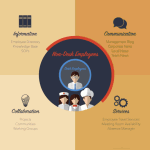My last blog post about the nonexistence of the social enterprise provoked the question about the main purpose of social business solutions: If Social Business is a tool, is there a wider strategic context where this tool fits in? To answer this question we would need a holistic model that describes the goals and fundamental concept of an enterprise and could then look for links between this model and capabilities of the social business approach. I will use here the EFQM Excellence model.
The EFQM Model…
…is a comprehensive management framework used by over 30 000 organisations in Europe and it continues to spread also into many other regions, e.g. the middle east. EFQM, formerly known as the European Foundation for Quality Management, goes back more than 20 years ago, when 14 CEOs joined forces in 1988 to develop a Management tool that would increase the competitiveness of European organisations. The model gets reviewed every three years to include learning’s and react to new challenges. It consists of three main parts:
1. The Fundamental Concepts of Excellence are the essential foundation of achieving Sustainable Excellence for any organisation.
2. Nine criteria to analyse the cause and effect relationships between what an organisation does and the results it achieves.
3. The RADAR Logic is a assessment framework to question the performance of an organisation.

From my own experience with the model it takes some time to understand the relation of those three pieces and how they are used to complete a full assessment of an organization within one week. The great advantage is that it provides a holistic and quantifiable view on an organization and the main concepts to make it an excellent one.
The Link to Social Business
The link to Social Business is best explained on the basis of the eight Fundamental Concepts of Excellence:
1. Adding Value for Customers
Excellent organisations consistently add value for customers by understanding, anticipating and fulfilling needs, expectations and opportunities.
Social Business contributions:
- Better way to listen to customers via own feedback channels or in the social media world.
- Direct interaction with customers at scale through social media channels for marketing, sales and service purposes.
- For B2B cases: collaboration with customers and partners within projects, support contracts or just providing specific documentation or learning material.
2. Creating a Sustainable Future
Excellent organisations have a positive impact on the world around them by enhancing their performance whilst simultaneously advancing the economic, environmental and social conditions within the communities they touch.
Social Business contributions:
- Better way to listen and directly respond to stakeholders and communities via own feedback channels or in the social media world.
- Social business channels (e.g. corporate blogs) are able to support an authentic and honest delivery of corporate messages.
3. Developing Organisational Capability
Excellent organisations enhance their capabilities by effectively managing change within and beyond the organisational boundaries.
Social Business contributions:
- Social business channels (e.g. management blogs) are able to support an authentic and honest delivery of internal communications.
- Social business platforms are very flexible and allow a fast adaption of the virtual information and collaboration landscape to changing structures, roles and responsibilities in the real world.
- Employees as well as formal and informal networks get more transparent. This transparency reduces the reliance on established management structures to let information flow within the organisation – even in situations of radical change.
4. Harnessing Creativity & Innovation
Excellent organisations generate increased value and levels of performance through continual improvement and systematic innovation by harnessing the creativity of their stakeholders.
Social Business contributions:
- Better way to listen to feedback and ideas from customers, employees and stakeholders via own innovation platform or in the social media world.
- Faster and cheaper way to test and get feedback on new ideas and improved products and services.
5. Leading with Vision, Inspiration & Integrity
Excellent organisations have leaders who shape the future and make it happen, acting as role models for its values and ethics.
Social Business contributions:
- The bad news: social business approaches will hardly create great leaders.
- The good news: if there is a great leader social business platforms will help her or him a lot to get the message across.
6. Managing with Agility
Excellent organisations are widely recognised for their ability to identify and respond effectively and efficiently to opportunities and threats.
Social Business contributions:
- Social business and it’s emphasis on real time information and feedback supports agility in many ways – see all other points in this list for examples.
7. Succeeding through the Talent of People
Excellent organisations value their people and create a culture of empowerment for the achievement of both organisational and personal goals.
Social Business contributions:
- Leaders can establish a more direct and interactive dialog with their people and make sure their vision and values are understood. This is the basis for empowered employees.
- People, their knowledge and their achievements get more visible and thus acknowledged within an organisation.
- Social business provides effective collaboration platforms to employees and help them to be more effective.
8. Sustaining Outstanding Results
Excellent organisations achieve sustained outstanding results that meet both the short and long term needs of all their stakeholders, within the context of their operating environment.
Social Business contributions:
- I stated this many times here at the blog: „Social“ is not an end in itself. It has to produce business results. All other points are paying into this one.


















Noch eine schöne Ergänzung einer Enterprise 2.0 Betrachtung auf der Ebene der Kriterien (Enablers und Results) von Frank Schönefeld und Michael Meyer. Die Präsentation ist hier zu finden: http://www.efqm.org/en/PdfResources/EFQM%20Forum%202011%20-%20Enterprise%202.0.pdf